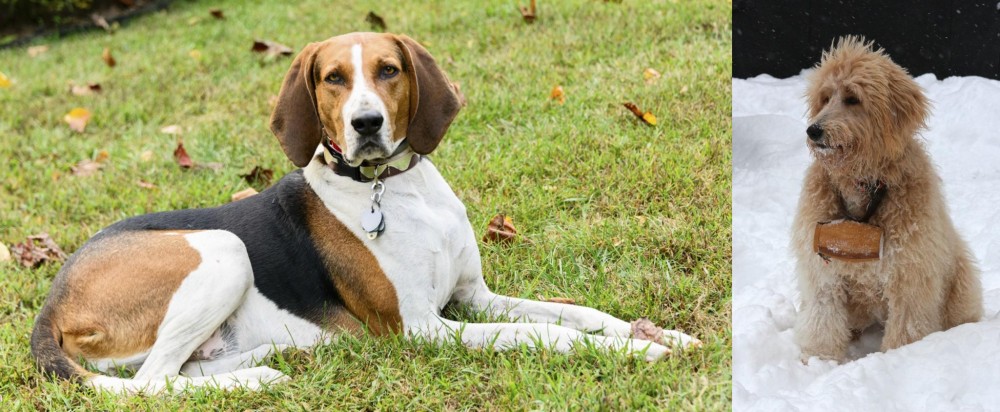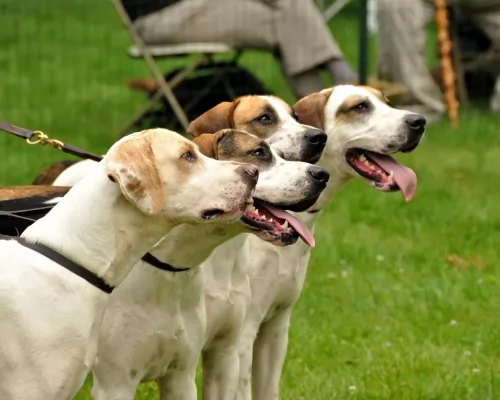 Petzlover
Petzlover Both American English Coonhound and Pyredoodle are originated from United States. American English Coonhound may grow 17 cm / 6 inches shorter than Pyredoodle. American English Coonhound may weigh 19 kg / 41 pounds lesser than Pyredoodle. Both American English Coonhound and Pyredoodle has same life span. American English Coonhound may have more litter size than Pyredoodle. American English Coonhound requires Low Maintenance. But Pyredoodle requires Moderate Maintenance
Both American English Coonhound and Pyredoodle are originated from United States. American English Coonhound may grow 17 cm / 6 inches shorter than Pyredoodle. American English Coonhound may weigh 19 kg / 41 pounds lesser than Pyredoodle. Both American English Coonhound and Pyredoodle has same life span. American English Coonhound may have more litter size than Pyredoodle. American English Coonhound requires Low Maintenance. But Pyredoodle requires Moderate Maintenance
 The American English Coonhound was developed in the Southern part of the United States from the variety of English hunting dogs that came to the States with the early settlers. At one point they were known as the Virginia Hound. This breed is well known for its prowess in hunting raccoons and her endurance and speed. Of course as a hound dog he loves to howl during the hunt and at home with the family. He can be frustrated and destructive if his energy and need for a job are not satisfied.
The American English Coonhound was developed in the Southern part of the United States from the variety of English hunting dogs that came to the States with the early settlers. At one point they were known as the Virginia Hound. This breed is well known for its prowess in hunting raccoons and her endurance and speed. Of course as a hound dog he loves to howl during the hunt and at home with the family. He can be frustrated and destructive if his energy and need for a job are not satisfied.
 These dogs only originated in the 1980s, and as a designer dog they are a cross between a Standard Poodle and the Great Pyrenees, both ancient dog breeds.
These dogs only originated in the 1980s, and as a designer dog they are a cross between a Standard Poodle and the Great Pyrenees, both ancient dog breeds.
The breeders were looking for a non-shedding variation of both these popular breeds. This dog isn’t part of the American Kennel Club’s (AKC) list of dogs.
 The American English Coonhound is an athlete with a deep chest and cute face. They have broad heads, domed skulls, dark eyes and soft, low ears. They are as fast and athletic as they look. These are highly athletic dogs with long legs and a slim but muscular body. They are so well built for their hunting role, that any deficiencies are quickly identified and bred out of the breed.
The American English Coonhound is an athlete with a deep chest and cute face. They have broad heads, domed skulls, dark eyes and soft, low ears. They are as fast and athletic as they look. These are highly athletic dogs with long legs and a slim but muscular body. They are so well built for their hunting role, that any deficiencies are quickly identified and bred out of the breed.
 The Pyredoodle is a large dog standing at between 60 and 86cm in height and weighing about 38 to 46kg.
The Pyredoodle is a large dog standing at between 60 and 86cm in height and weighing about 38 to 46kg.
The coat varies quite a bit, depending on which breed the dog leans towards. Colors can be white, cream, apricot, silver or black. Essentially the coat is a thick double-coat of medium length hair which is fairly straight or wavy.
The dog is a low shedder, thought to have a hypoallergenic coat. Floppy ears mean you will need to check inside the ears for redness and infection brought on by an excess wax build-up, dirt and moisture. If you allow your Pyredoodle to become a parent, the can produce between 2 to 4 puppies.
Coming from dogs with good temperaments, the Pyredoodle comes as being good natured. He plays well with children and gets on well with other animals in the house.
He is protective and takes his role as watchdog seriously. You can be sure he is going to be a loyal family dog. His high intelligence means he can be trained and socialized with ease and then he becomes obedient and well mannered.
He is good with children, and even though he is looked upon as being sweet natured, he still makes a great watchdog and protector of his human family.
 The American English Coonhound knows how to relax just as much as he knows how to work. He is mellow after work and tenacious in the chase. This is not the dog for a first-time owner. They are stubborn and hard to train. They howl and bark at home as much as they do on the hunt. They need a strong pack leader, especially when living in the city or neighborhoods.
The American English Coonhound knows how to relax just as much as he knows how to work. He is mellow after work and tenacious in the chase. This is not the dog for a first-time owner. They are stubborn and hard to train. They howl and bark at home as much as they do on the hunt. They need a strong pack leader, especially when living in the city or neighborhoods.
They are outgoing and friendly and very sensitive. They mature later than most other breeds their size. They are about 2 when they mature.
 Attractive to look at, independent in nature, the Pyredoodle also has watchdog characteristics, being a protector of his human family.
Attractive to look at, independent in nature, the Pyredoodle also has watchdog characteristics, being a protector of his human family.
Like any dog, and particularly big dogs, it is important to train the Pyredoodle otherwise he could be too active and unruly when he comes indoors.
The Pyredoodle will absolutely thrive in a loving home where the people enjoy an active lifestyle.
The Pyredoodle comes from too excellent dog breeds. Both breeds make excellent watch dogs, they’re intelligent dogs who can be easily be trained. You can expect your crossbreed dog to be a loving, loyal, devoted pet who will add a wonderful dimension to your household.
 If kept active and happy, the American English Coonhound has very few health problems. The benefit from a large gen pool but do have some health concerns including elbow and hip dysplasia, ear infections, cataracts, bloat, and Progressive Retinal Atrophy. They do have a tendency to gain weight as they age. These issues will be addressed in more detail below. DNA testing is available for the dysplasia and eye issues.
If kept active and happy, the American English Coonhound has very few health problems. The benefit from a large gen pool but do have some health concerns including elbow and hip dysplasia, ear infections, cataracts, bloat, and Progressive Retinal Atrophy. They do have a tendency to gain weight as they age. These issues will be addressed in more detail below. DNA testing is available for the dysplasia and eye issues.
 Designer dogs are often bred with the idea to eliminate some of the typical, common health issues that plague most dogs. These are among others, bloat, cancer, hip dysplasia, skin issues, ear infections, obesity, dental disease and others.
Designer dogs are often bred with the idea to eliminate some of the typical, common health issues that plague most dogs. These are among others, bloat, cancer, hip dysplasia, skin issues, ear infections, obesity, dental disease and others.
It is highly unlikely that your lively Pyredoodle will succumb to any of the major dog illnesses, but you need to watch him and get him to the vet when you see him displaying unnatural symptoms.
It is beneficial for your pet's health to have it neutered or spayed if you aren't interested in the dog having puppies.
 your working American English Coonhound needs different food than one who is not working. So, if you hunt with your dog remember he really needs the calories to keep his energy up. However, they can get obese as they age so cut back with less activity and more years. Watch the number of treats when training.
your working American English Coonhound needs different food than one who is not working. So, if you hunt with your dog remember he really needs the calories to keep his energy up. However, they can get obese as they age so cut back with less activity and more years. Watch the number of treats when training.
Elbow and Hip Dysplasia – the joint issues prevent the bones from connecting and functioning properly. Any good breeder of American English Coonhounds will do tests for both.
Eye issues range from cataracts to PRA (Progressive Retinal Atrophy) Again there are tests available for these conditions.
Bloat is a condition many medium to large size dogs can experience when their stomach can become inverted and intestines distended. The is a situational issue and can’t be predicted. Don’t allow your coonhound to wolf down food right before exercise and feed him more than once a day in a smaller meal.
The American English Coonhound needs a lot of exercise and has an extremely strong work and prey drive.
 The Pyredoodle is a large dog who will need regular exercise. Apart from walks every day, he’ll need ball- and rope games, throwing the frisbee, hide and seek games as well as games and toys that keep him mentally active as well.
The Pyredoodle is a large dog who will need regular exercise. Apart from walks every day, he’ll need ball- and rope games, throwing the frisbee, hide and seek games as well as games and toys that keep him mentally active as well.
With the Pyredoodle, never try to skimp on his food and buy the cheapest there is. He’ll get sick often because of the unwholesome ingredients such as colorants, preservatives, fillers and very few vitamins and minerals.
If you choose one of the commercially manufactured dog foods, make sure it is the high quality ones. Give him a treat now and again by providing him with tasty home-cooked food. It doesn’t have to be every day, just once or twice a week.
An excellent choice of food is boiled chicken, brown rice or pasta, sweet potatoes, carrots and spinach, all chopped up and added to the dry kibble. When you can, try and include a little bit of raw meat too. Make sure he has constant access to fresh, cool water.
The Pyredoodle can have a coat which can be either short and thick or it can be longer, wavy or quite curly. Grooming will be aimed at removing any loose hairs the dog has by brushing twice a week. The dog is a low shedder.
His floppy ears may mean you needing to check the insides to ensure they are free from infection. Other grooming for this dog includes trimming the nails, checking his eyes and looking inside his mouth for rotting teeth. A bad tooth can be terribly painful for your pet but it can also cause problems with other body parts such as the heart and kidneys.
Get your pet immediately to the vet if you suspect anything that can be detrimental to your dog’s health.